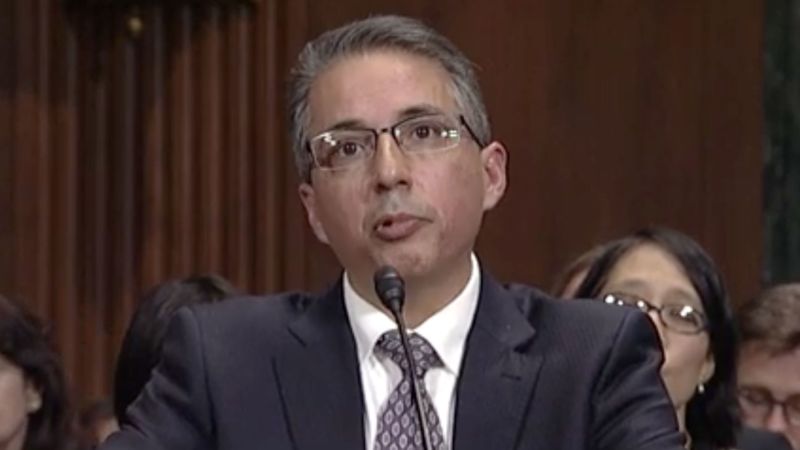CNN
—
A Donald Trump-appointed federal judge in Texas ruled that the president unlawfully invoked the Alien Enemies Act and blocked the administration from quickly deporting some alleged members of a Venezuelan gang.
US District Judge Fernando Rodriguez of the Southern District of Texas said Trump had unlawfully invoked the sweeping 18th century wartime authority to speed up some deportations. His decision means Trump cannot rely on the law to detain or deport any alleged members of the Venezuelan gang Tren de Aragua within his district.
The ruling is a significant blow to Trump’s decision in March to invoke the Alien Enemies Act, which has faced numerous legal challenges and has been halted by several courts. But Rodriguez’s ruling is the first to conclude that the president exceeded his authority by relying on a law that was intended to be used during times when the US is at war.
The Trump administration, Rodriguez wrote, does “not possess the lawful authority under the AEA, and based on the Proclamation, to detain Venezuelan aliens, transfer them within the United States, or remove them from the country.”
“The President cannot summarily declare that a foreign nation or government has threatened or perpetrated an invasion or predatory incursion of the United States, followed by the identification of the alien enemies subject to detention or removal,” the judge wrote.
He continued: “Allowing the President to unilaterally define the conditions when he may invoke the AEA, and then summarily declare that those conditions exist, would remove all limitations to the Executive Branch’s authority under the AEA, and would strip the courts of their traditional role of interpreting Congressional statutes to determine whether a government official has exceeded the statute’s scope. The law does not support such a position.”
Although Trump’s use of the Alien Enemies Act has been litigated in multiple courts nationwide, including the Supreme Court, Rodriguez is the first judge to have reached a final decision on the merits.
“The importance of this ruling cannot be overstated,” said Lee Gelernt, an attorney with the American Civil Liberties Union who helped bring the legal challenge.
“This is the first court to squarely rule on the fundamental question of whether a wartime authority can be used during peacetime and properly concluded it can not,” Gelernt said.
The Venezuelans suing had narrowly avoided being sent to El Salvador under the Alien Enemies Act when two flights took migrants to the country’s notorious CECOT prison in March.
They were continuing to sue so that the administration wouldn’t try again to deport them under the Alien Enemies Act. The judge says other immigration laws governing deportations could still be used, and the men are still being held in a facility in south Texas.
Last month, the Supreme Court, without reaching the merits of Trump’s use of the 1798 law for deportations, said that sufficient notice needed to be given by officials to people targeted under it so the migrants could raise legal challenges if they wanted to. The court also ruled that the migrants Trump is targeting must challenge their removal under a habeas petition in a district court with geographic jurisdiction over the place where they are being held.
But that decision was light on details, and weeks later, the justices were asked to intervene in a case out of the Northern District of Texas in which some Venezuelan migrants claimed they hadn’t received adequate notice of the government’s intention to swiftly deport them under the law.
In a middle-of-the-night order, the high court said no one who the Trump administration was preparing to deport under the Alien Enemies Act who are being held in a northern Texas detention facility can be removed while it considers the emergency appeal. The court is still considering the request.
The administration is likely to appeal Rodriguez’s ruling to the conservative 5th US Circuit Court of Appeals, and it’s possible the case could eventually land before the Supreme Court.
But there are separate groups of detainees in different places around the country, like in Colorado, Pennsylvania and Nevada, whom the administration had been gearing up to deport using the AEA, making each judges’ decisions in lower courts notable as several court cases like these continue this month.
The administration has argued that Trump was justified in using the Alien Enemies Act to target alleged members of Tren de Aragua, which the government has designated a foreign terrorist organization. But it’s also said that courts don’t have the power to review the president’s invocation of the law, something Rodriguez strongly rejected on Thursday.
The judge acknowledged that while he “may not adjudicate the veracity of the factual statements” made in Trump’s proclamation invoking the wartime authority, he “retains the authority to construe the AEA’s terms and determine whether the announced basis for the Proclamation properly invokes the statute.”
CNN’s John Fritze contributed to this report.
This story has been updated with additional details.

